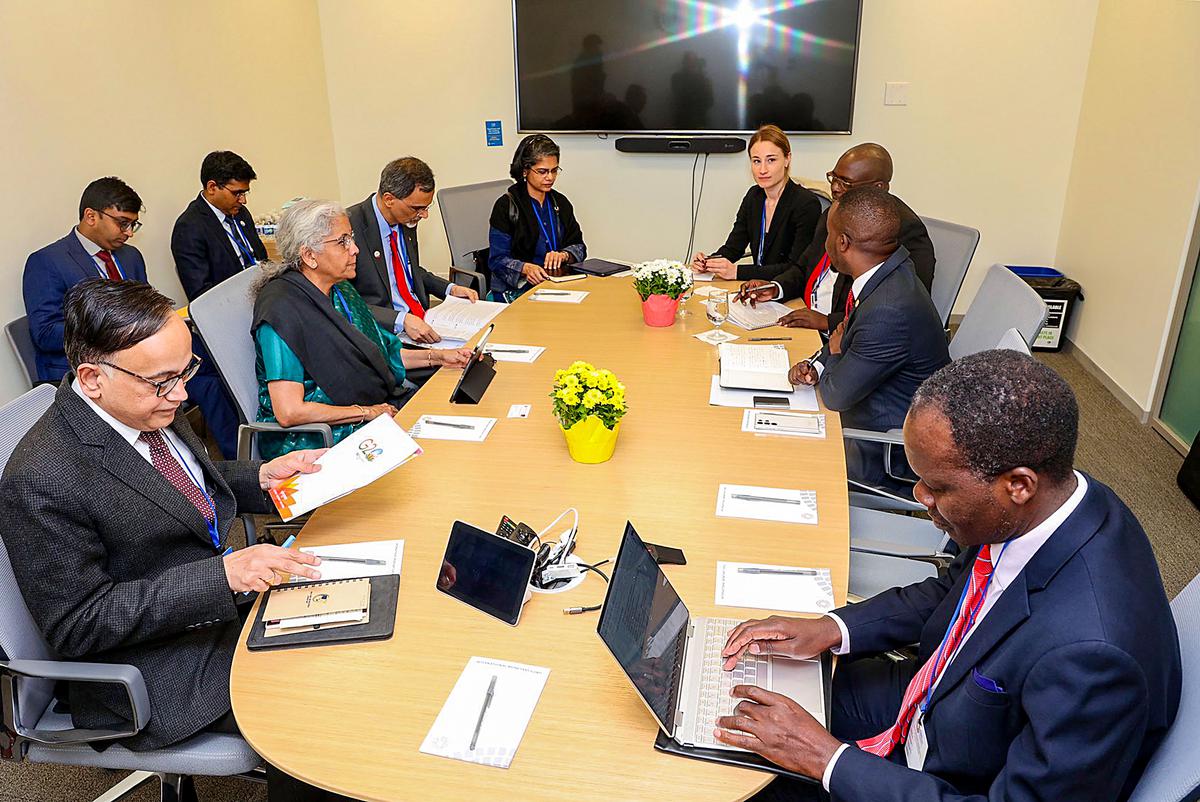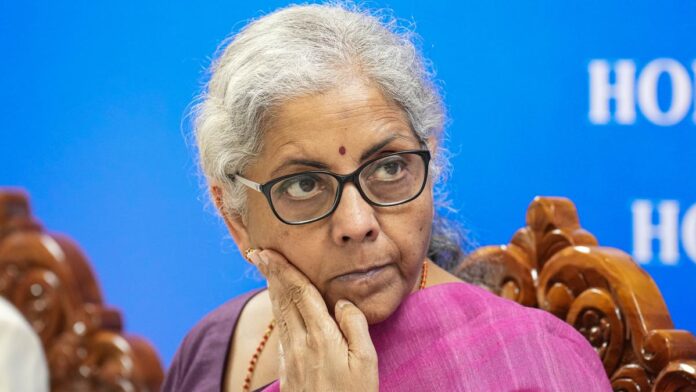
File photo of Union Finance Minister Nirmala Sitharaman. Ms. Sitharaman on April 10, 2023, spoke about middle-income countries’ debt distress at the Peterson Institute in Washington DC, U.S.
| Photo Credit: PTI
Ahead of the G20 Finance Ministers and Central Bank Governors (FMCBG) meeting on April 12 and 13, Finance Minister Nirmala Sitharaman expressed hope that the group could come together to address the debt distress of middle-income countries (MICs).
While there could be “one or two” issues on which consensus is not possible, the Finance Minister said India’s presidency “is a great opportunity for India to prove and to work towards bringing all countries together on substantive issues”.
Her comments were made at the Peterson Institute in Washington DC during a conversation with the think-tank’s president Adam Posen.
Ms. Sitharaman highlighted the debt distress of middle-income countries (MICs) particularly. She said she was glad that multilateral institutions (i.e., the World Bank, IMF) were speeding up their work on this.

Union Finance Minister Nirmala Sitharaman with Minister of Finance and Economic Affairs of the Republic of Malawi Sosten Gwengwe during a delegation-level meeting on the sidelines of the World Bank-IMF Spring Meetings 2023, in Washington D.C on April 10, 2023.
| Photo Credit:
PTI
Three countries in India’s neighbourhood — Sri Lanka, Pakistan and Bangladesh — have sought help from the IMF.
India is particularly keen that middle-income countries’ debt distress is addressed by the G20. The group’s debt restructuring process, the 2020 Common Framework, which has largely catered to poor countries, has been slow to act, with just four countries (Chad, Zambia, Ethiopia and Ghana) to date having applied for debt restructuring through the framework. China, which is a major creditor country for low-income countries has been blamed for not playing ball on the issue of debt restructuring.
‘Trade deal with U.K. is in process’
During the interaction, the Finance Minister said, in passing, that the trade deal with the U.K. was still under discussion. The Times of London, on Monday, had quoted the U.K. government sources as saying the Indian government had “disengaged” from trade talks, and was waiting for the British government to publicly condemn pro-Khalistan protests. Earlier on Monday, The Hindu had reported that the government called the reports of talks being cancelled “baseless”.
“We shall proceed in that route [the free trade agreement or FTA route] also with the United Kingdom with the European Union and with Canada. All the three are happening now, as we speak the negotiations are going on,” Ms. Sitharaman said.
Globalisation must be transparent: Sitharaman
Ms. Sitharaman called for change at the World Trade Organisation (WTO) and criticised countries and regions – such as Europe – for considering a carbon border adjustment tax.
She said that she would like the WTO to be more “progressive” and “fair to all members”, taking on board more members’ views, have “ greater openness” and not just hear but also “somewhat heed” the voices of countries that have different views.
She said a number of decisions have not been taken at the WTO in decades, cting the example of a 1998 WTO moratorium on customs duties on electronic transmissions, when the world of electronic transactions had changed significantly since that time.
“It’s that which I’d like to question,” she said, adding that she was not arguing to reverse globalisation but to “make globalisation more transparent”.
Expressing enthusiasm for the Joe Biden administration’s Indo-Pacific Economic Forum (IPEF), Ms. Sitharaman said she would like to see “greater substantive discussion” for the three pillars India had signed up to (supply chains, clean economy and fair economy) and also for the fourth pillar on trade, of which India is not a part.
“More needs to be done, substantially,” she said.
Denies problem with India’s treatment of Muslims, Opposition politicians
Ms. Sitharaman was asked about her sense of capital flows to India and their relationship to unfavourable perceptions in the West about opposition Indian MPs losing their status and violence against the country’s Muslims. The minister asked investors to visit the country for themselves.
She said the Muslim population in India had been increasing, suggesting that was inconsistent with Muslims being persecuted as described in the Western press. She then pointed to Pakistan as a contrast. Every minority (including some Muslim sects) had been “decimated” in Pakistan, Ms. Sitharaman said.
She also argued that law and order was a State subject. “So, across the board in India violence is happening to make Muslims get affected itself is a fallacy as a statement. It cannot be so. Each province and its police are different,” she said.
The minister invited the authors of these reports to visit and travel around India. “I’ll host them,” she said.
#Nirmala #Sitharaman #urges #G20 #debt #distress #middleincome #countries
